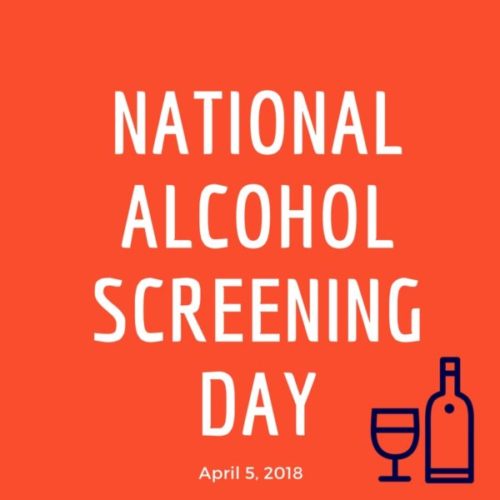National Alcohol Screening Day
National Alcohol Screening Day (NASD) is an initiative first launched in 1999 by the National Institutes of Health (NIH). NASD is held annually on the first Thursday of the first full week of April. The purpose of this event is to increase public awareness that alcohol abuse and alcoholism are recognized disorders which can be treated. During this day, members of the public are encouraged to visit screening centers and asked to complete written self-assessments about their alcohol use.
According to The Community Guide, there are 2,000 alcohol poisoning deaths in the U.S. each year and alcohol abuse is higher in college students, who do tend to frequently drink in large volumes. Excessive, fast consumption of alcohol is known as ‘binge drinking’, and this kind of alcohol abuse can lead to many recognized health problems such as anxiety, depression or sexual problems. The long-term effects of alcohol abuse include an increased risk of developing certain cancers, liver cirrhosis, high blood pressure and heart problems.
National Alcohol Screening Day awareness continues to grow nationally, and the U.S. government is supporting programs and policies to reduce binge drinking and expand access through the Affordable Care Act to new health insurance plans to cover alcohol screening and brief counseling. The National Institute on Drug Abuse (NIDA) has launched two online screening tools that providers can use to assess for substance use disorder (SUD) risk among adolescents 12-17 years old.
Two Screening Options: Providers can select the tool that makes sense for their clinical practice.
The CAGE can identify alcohol problems over the lifetime. Two positive responses are considered a positive test and indicate further assessment is warranted.
The questionnaire takes less than one minute to administer and is often used in the primary care of other general settings as a quick screening tool rather than as an in-depth interview for those who have alcoholism. The CAGE questionnaire does not have a specific intended population and is meant to find those who drink excessively and need treatment. The CAGE questionnaire is reliable and valid for assessment of alcohol abuse; however, it is not valid for diagnosis of other substance use disorders, although somewhat modified versions of the CAGE questionnaire have been frequently implemented for such a purpose.
The Alcohol Use Disorders Identification Test (AUDIT) can detect alcohol problems experienced in the last year. A score of 8+ on the AUDIT generally indicates harmful or hazardous drinking. Questions 1–8 = 0, 1, 2, 3, or 4 points. Questions 9 and 10 are scored 0, 2, or 4 only. The Audit-C is a 3-item alcohol screen that can help identify persons who are hazardous drinkers or have active alcohol use disorders (including alcohol abuse or dependence). The AUDIT-C is a modified version of the question AUDIT instrument.

